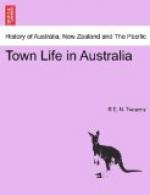Of all the Australian provinces, there is none with the immediate resources and future prospects of the Mother Colony. On her varied soils and amidst her different climates, wool, wheat, wine, and sugar all find a roomy and congenial home. Gold, copper, and tin are not wanting; and close to the seaboard she has an unbounded supply of coal, which must eventually be of more service in raising up manufacturing industries than all the protective tariffs of Victoria. The early circumstances of New South Wales were against its rapid growth. Founded as a receptacle for convicts, a system akin to slavery soon took root. Such of the early settlers as were neither gentlemen nor convicts belonged to the lowest class, or joined it soon after they landed. The colony was more than half a century old before it got any backbone; and although the descendants of convicts have in most cases proved excellent colonists, it took some time before ‘trust in the people’ could get the upper hand of fear. Even now, when but few of the last convicts remain above ground, and the masses of the population consist of immigrants in every way equal to the other colonies, the spirit of Conservatism is still ingrained in New South Wales. The shadow of the past still lingers behind in its comparative social and political stagnation, in an indolence and want of enterprise which is past all understanding to the Victorian, and a cherishing of prejudices long after they have been rooted out in the Sister Colonies. Even that arch-Democrat Sir Henry Parkes can only govern the colony by setting himself up as the reverse of Mr. Berry.




